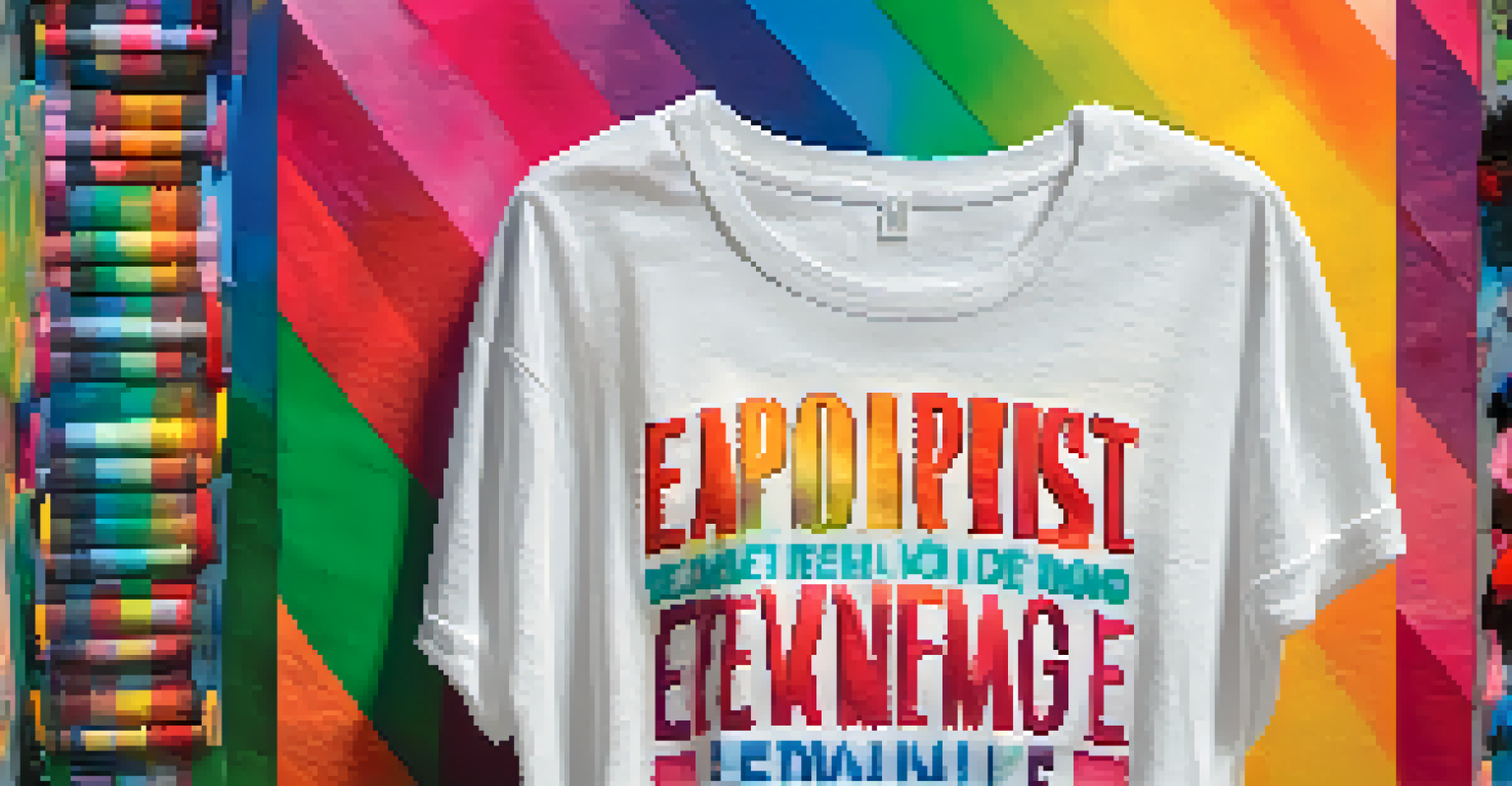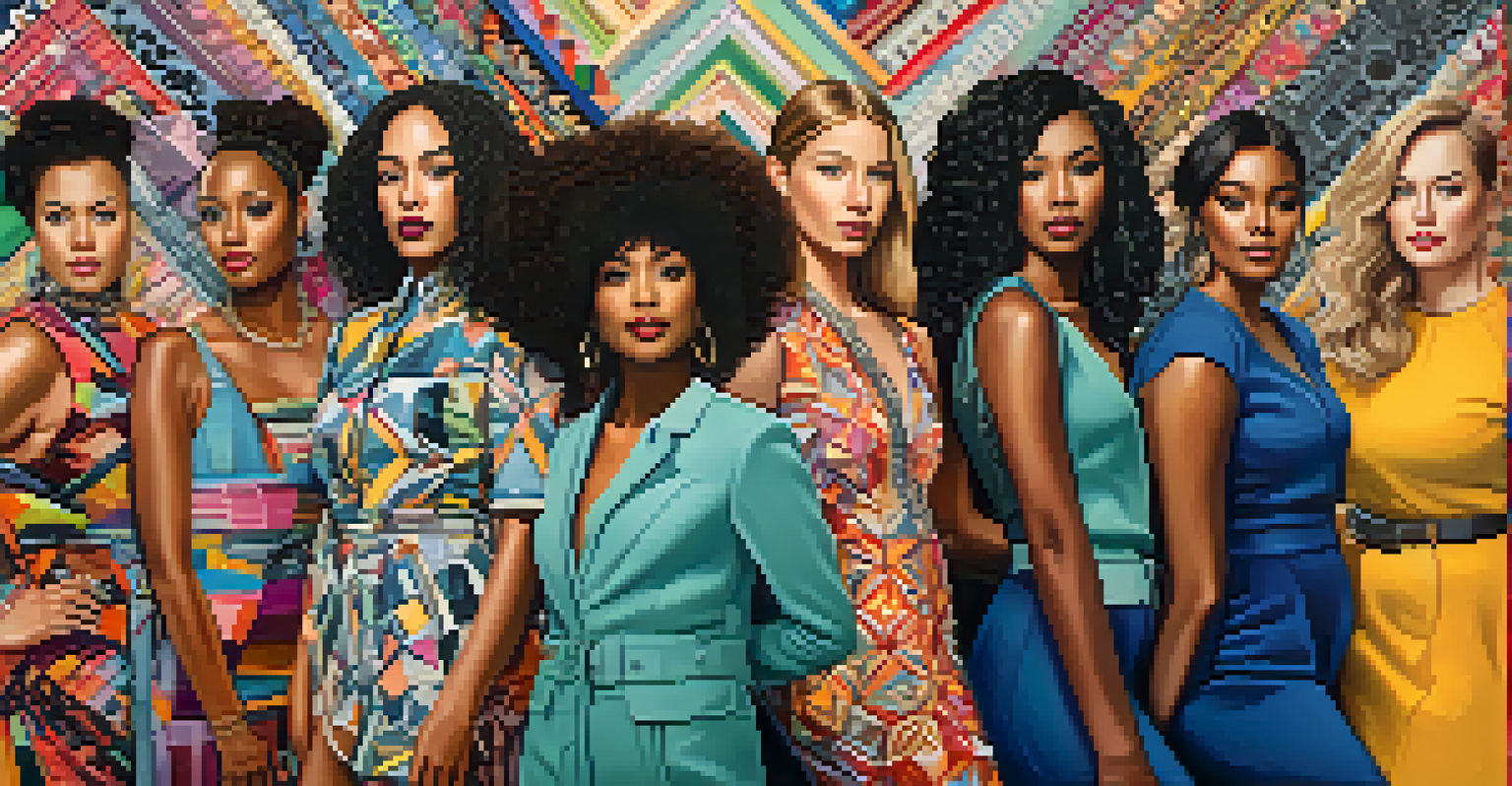The Intersection of Feminism and Fashion Trends

The Historical Roots of Feminism in Fashion
Fashion has always been intertwined with the women's rights movement. In the early 20th century, suffragettes donned white dresses as a symbol of purity and equality. These early sartorial choices were not just about style; they were bold statements of defiance against societal norms.
Fashion is the armor to survive the reality of everyday life.
As the feminist movement evolved, so did the clothing women wore. The 1960s brought about the miniskirt, a symbol of liberation and rebellion against traditional gender roles. This shift in fashion reflected a broader cultural change and empowered women to express their individuality.
Today, we see a continued dialogue where fashion serves as a canvas for feminist expression. Each garment can tell a story, showcasing how far women have come and the battles still being fought, making the intersection of feminism and fashion a rich area of exploration.
Modern Icons Redefining Feminism Through Fashion
In recent years, celebrities have taken center stage in merging feminism with fashion. Icons like Beyoncé and Rihanna use their platforms not just to showcase their style but to promote messages of empowerment. Their clothing choices often reflect themes of strength, resilience, and independence.

These modern icons also emphasize inclusivity, showcasing diverse body types and challenging traditional beauty standards. This shift is crucial in the fashion industry, as it encourages women of all shapes and sizes to embrace their individuality.
Fashion's Role in Feminist History
Fashion has historically been a powerful medium for women's rights, evolving from suffragette symbolism to modern expressions of individuality.
By embracing both personal style and feminist ideals, these figures inspire countless women to express themselves authentically. They remind us that fashion can be a powerful tool for change, encouraging a new generation to challenge societal expectations.
The Role of Sustainable Fashion in Feminism
Sustainability has become a significant theme within both feminism and fashion. As women increasingly lead the charge for eco-friendly practices, the fashion industry is being urged to adopt more ethical standards. This movement aligns with feminist principles, advocating for fair labor practices and environmental responsibility.
I think there is beauty in everything. What ‘normal’ people would perceive as ugly, I can usually see something of beauty in it.
Brands are now being held accountable for their production processes. Female entrepreneurs are at the forefront of this change, creating clothing that respects both the planet and its people. For many, sustainable fashion is not just a trend; it’s a lifestyle rooted in values of equality and respect.
By choosing sustainable fashion, consumers are making a statement that resonates with feminist ideals—supporting brands that empower women and protect the environment. This intersection is a powerful reminder that fashion can reflect our values and contribute to global change.
Fashion as a Medium for Feminist Activism
Fashion has become a vital medium for feminist activism, offering a platform to voice social issues. From T-shirts adorned with slogans to runway shows that challenge norms, clothing can be a form of protest. This creative expression draws attention to critical issues like body positivity, gender equality, and reproductive rights.
Events like the Women's March have seen participants donning empowering attire, making it clear that fashion can raise awareness. When women wear their beliefs, they spark conversations that extend beyond their outfits, creating a ripple effect in society.
Sustainable Fashion and Feminism
The push for sustainable fashion aligns with feminist ideals, advocating for ethical practices and empowering women in the industry.
This blend of activism and fashion not only fosters community among like-minded individuals but also invites others to engage in these conversations. By making bold fashion choices, activists challenge the status quo and inspire change in the world around them.
The Impact of Social Media on Feminism and Fashion
Social media has revolutionized how feminism and fashion intersect, creating a global stage for discussion and inspiration. Platforms like Instagram and TikTok allow diverse voices to share their experiences and showcase their unique styles. This democratization of fashion fosters inclusivity and encourages women to express themselves freely.
Influencers and activists use these platforms to highlight issues surrounding body image and self-acceptance. By sharing their journeys, they empower others to embrace their flaws and celebrate their uniqueness. This collective movement promotes a broader understanding of beauty that transcends conventional standards.
Moreover, social media campaigns often drive the message home with urgency. Viral hashtags can elevate discussions about feminism in fashion, making it clear that this intersection is more than just aesthetics—it's about identity, empowerment, and social change.
Challenging Gender Norms Through Fashion Choices
The fashion industry has seen a significant shift in challenging traditional gender norms. Designers are increasingly creating gender-neutral clothing, allowing everyone to express themselves without the confines of societal expectations. This evolution is pivotal in breaking down stereotypes and promoting inclusivity.
For many, fashion is a form of self-identification. By embracing styles that defy gender categorization, individuals can communicate their identity authentically. This change encourages a broader acceptance of diverse expressions, allowing people to wear what makes them feel comfortable and confident.
Social Media's Impact on Fashion
Social media has transformed how feminism and fashion intersect, enabling diverse voices to share their stories and promote inclusivity.
As we witness these shifts, it's essential to recognize how fashion can redefine societal norms. By supporting brands that prioritize diversity and inclusivity, we contribute to a culture that celebrates all identities, pushing the boundaries of what fashion can represent.
The Future of Feminism in Fashion Trends
Looking ahead, the future of feminism in fashion appears promising and transformative. As more women take leadership roles within the industry, we can expect to see a continued emphasis on diversity, sustainability, and empowerment. This evolution not only enriches the fashion narrative but also aligns with broader societal shifts towards equality.
Emerging designers are increasingly blending traditional craftsmanship with modern values, creating collections that reflect both artistry and activism. This fusion encourages consumers to think critically about their choices and the impact they have on the world.

Ultimately, the future of fashion is bright, as it continues to serve as a powerful tool for feminist expression. By supporting innovative voices and sustainable practices, we can ensure that the industry evolves in a way that uplifts and empowers women everywhere.